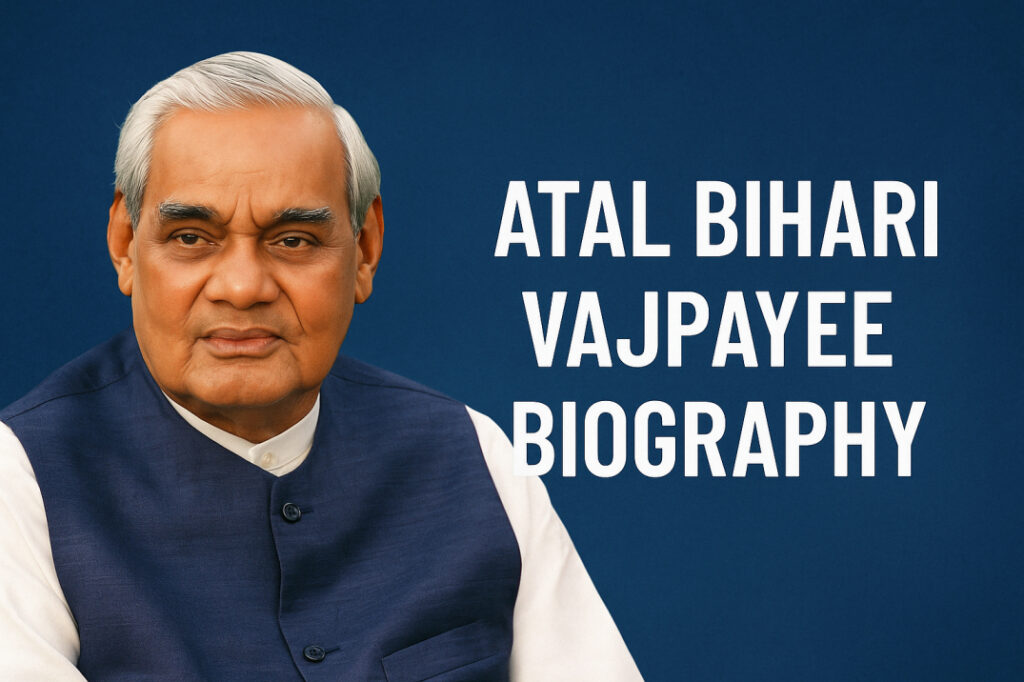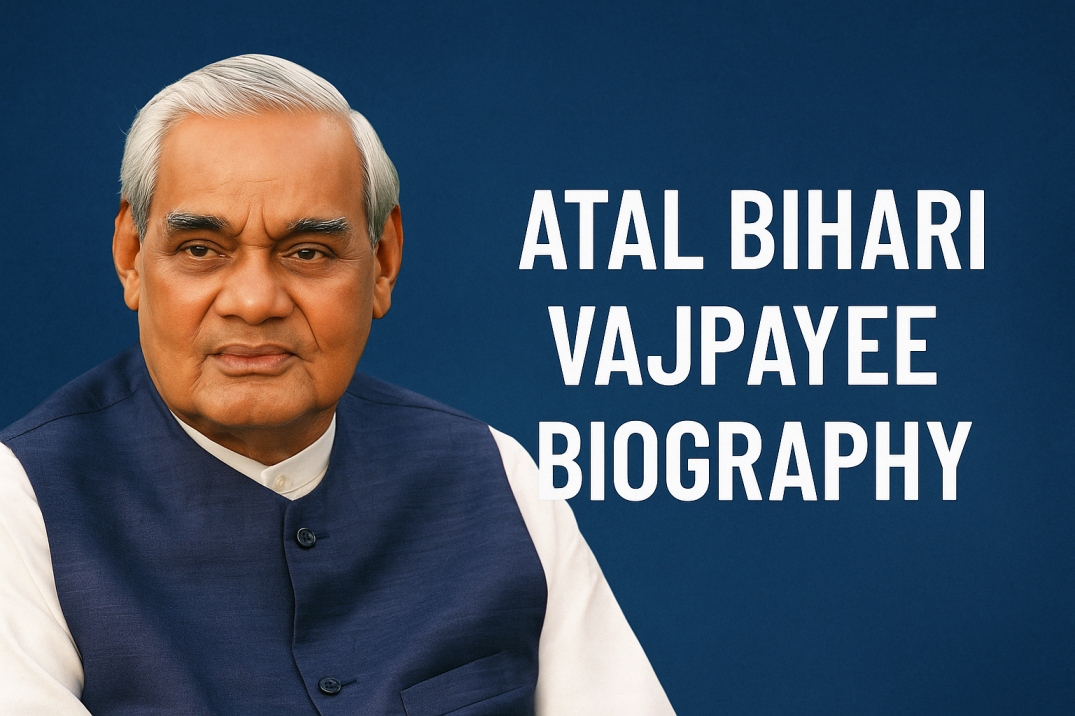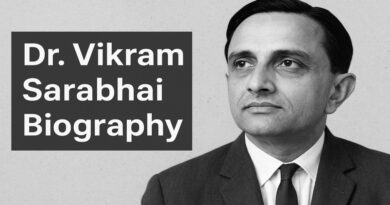Atal Bihari Vajpayee Biography – Life, Career, Achievements & Legacy, full details 2025 updated
Atal Bihari Vajpayee Biography – Life, Career, Achievements & Legacy, full details 2025 updated
Introduction – Atal Bihari Vajpayee Biography
Atal Bihari Vajpayee was one of India’s most respected political leaders, a gifted orator, a visionary Prime Minister, and a poet at heart. He served as the 10th Prime Minister of India and was known for his statesmanship, moderation, and efforts toward national unity. Vajpayee remains a towering figure in Indian politics and continues to inspire generations.
Early Life and Education
Atal Bihari Vajpayee was born on 25 December 1924, in the historic city of Gwalior, located in present-day Madhya Pradesh. His father, Krishna Bihari Vajpayee, was a school teacher and a Sanskrit scholar. Atal Ji completed his schooling from Saraswati Shishu Mandir and went on to study at Victoria College (now Laxmi Bai College) in Gwalior, where he pursued Hindi, Sanskrit, and English.
He went on to complete his M.A. in Political Science from DAV College, Kanpur. His passion for writing and public speaking was evident early in his academic life, and he became involved with the Rashtriya Swayamsevak Sangh (RSS) during his college days.
Table of Contents
Political Journey
Atal Bihari Vajpayee began his political journey in the 1940s as a freedom fighter. He later became an active member of the Bharatiya Jana Sangh, founded by Dr. Syama Prasad Mookerjee. In 1957, he was elected to the Lok Sabha from the Balrampur constituency in Uttar Pradesh.
In 1980, Vajpayee co-founded the Bharatiya Janata Party (BJP) and became its first President. His moderate stance and powerful speeches soon made him a favorite among both supporters and political opponents.
Prime Minister of India
Atal Bihari Vajpayee served as Prime Minister of India three times:
- May 1996 – For 13 days
- March 1998 to May 1999 – For 13 months
- 1999 to 2004 – A full five-year term
His government is remembered for stability, progress, and landmark reforms. In 1998, under his leadership, India successfully carried out the Pokhran-II nuclear tests, firmly establishing itself as a nuclear power on the world stage.
Major Achievements
- Pokhran Nuclear Tests (1998): India tested its nuclear weapons successfully, proving its strength and sending a strong message of self-reliance and security to the world.
- Golden Quadrilateral Project: A massive highway development project to connect major cities.
- Economic Reforms: Liberalized the telecom and IT sectors, laying the foundation for the digital era.
- Kargil War Leadership (1999): Vajpayee showed calm and decisive leadership during the Kargil conflict, guiding India through a critical military challenge with strength and dignity.
- Bus Diplomacy: Initiated peace talks with Pakistan through the Delhi-Lahore bus service.
Personal Life
Atal Bihari Vajpayee remained unmarried throughout his life and was admired for his simple lifestyle and strong self-discipline. He had a deep love for Hindi poetry and published several collections, including ‘Meri Ekyavan Kavitayen’ (My 51 Poems). His passion for the Hindi language earned him great respect across the country.

Retirement and Death
Vajpayee retired from active politics due to poor health after 2005. He was conferred the Bharat Ratna, India’s highest civilian award, in 2015. He passed away on 16th August 2018 in New Delhi at the age of 93.
Every year, December 25th, Vajpayee’s birthday, is celebrated across India as Good Governance Day in honor of his commitment to honest and effective leadership.
5 important life lessons of Atal Bihari Vajpayee
1. Words Have Power
Vajpayee was a master orator whose speeches inspired millions. He showed that respectful, thoughtful words can build bridges, unite people, and lead nations.
Lesson: Communicate with clarity, grace, and purpose. Words can heal or hurt—choose them wisely.
2. Patience Leads to Strength
He waited for decades to become Prime Minister, never giving up despite setbacks. His calm and balanced nature was one of his greatest strengths, helping him lead with wisdom even in tough times.
Lesson: Stay patient and focused. True success takes time, consistency, and resilience.
3. Respect All, Even Opponents
Despite political rivalries, Vajpayee maintained respect across party lines. His humility won admiration from allies and adversaries alike.
Lesson: Treat everyone with respect. True leadership shines through character, not conflict.
4. Lead with Vision, Not Ego
From nuclear policy to infrastructure, Vajpayee’s decisions were nation-first, not self-first. He thought long-term, beyond votes and fame.
Lesson: Think beyond yourself, true leadership comes from having a vision that serves others, not just your own goals. Great leaders serve a greater cause.
5. Stay Rooted in Simplicity
Despite reaching the highest office, he lived simply—valuing poetry, peace, and principles.
Lesson: No matter how high you rise, stay grounded. Simplicity is strength.
Legacy
Atal Bihari Vajpayee will always be remembered for his legacy of peace, development, and heartfelt poetry that touched millions. He is remembered as a leader who rose above party lines and worked for the nation’s greater good. His calm demeanor, balanced policies, and emotional connection with people made him one of India’s most loved Prime Ministers.
Interesting Facts
- He was the first non-Congress Prime Minister to serve a full five-year term.
- Vajpayee’s oratory skills were unmatched; his speeches in Parliament are still studied.
- He adopted a daughter, Namita Bhattacharya, and valued a simple, close-knit family life despite his busy political career.
Final Thoughts
Atal Bihari Vajpayee was a rare blend of intellect, emotion, and action. His contributions to India’s development and democracy will always be cherished. As a poet-politician and statesman, his legacy is timeless and will continue to guide India’s path forward.
Read more Biography
![]()




